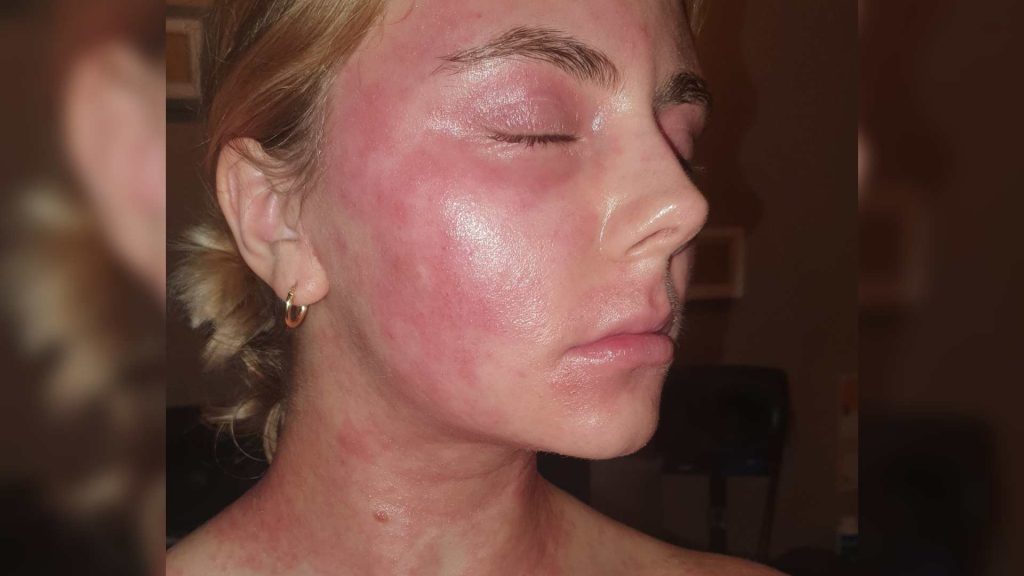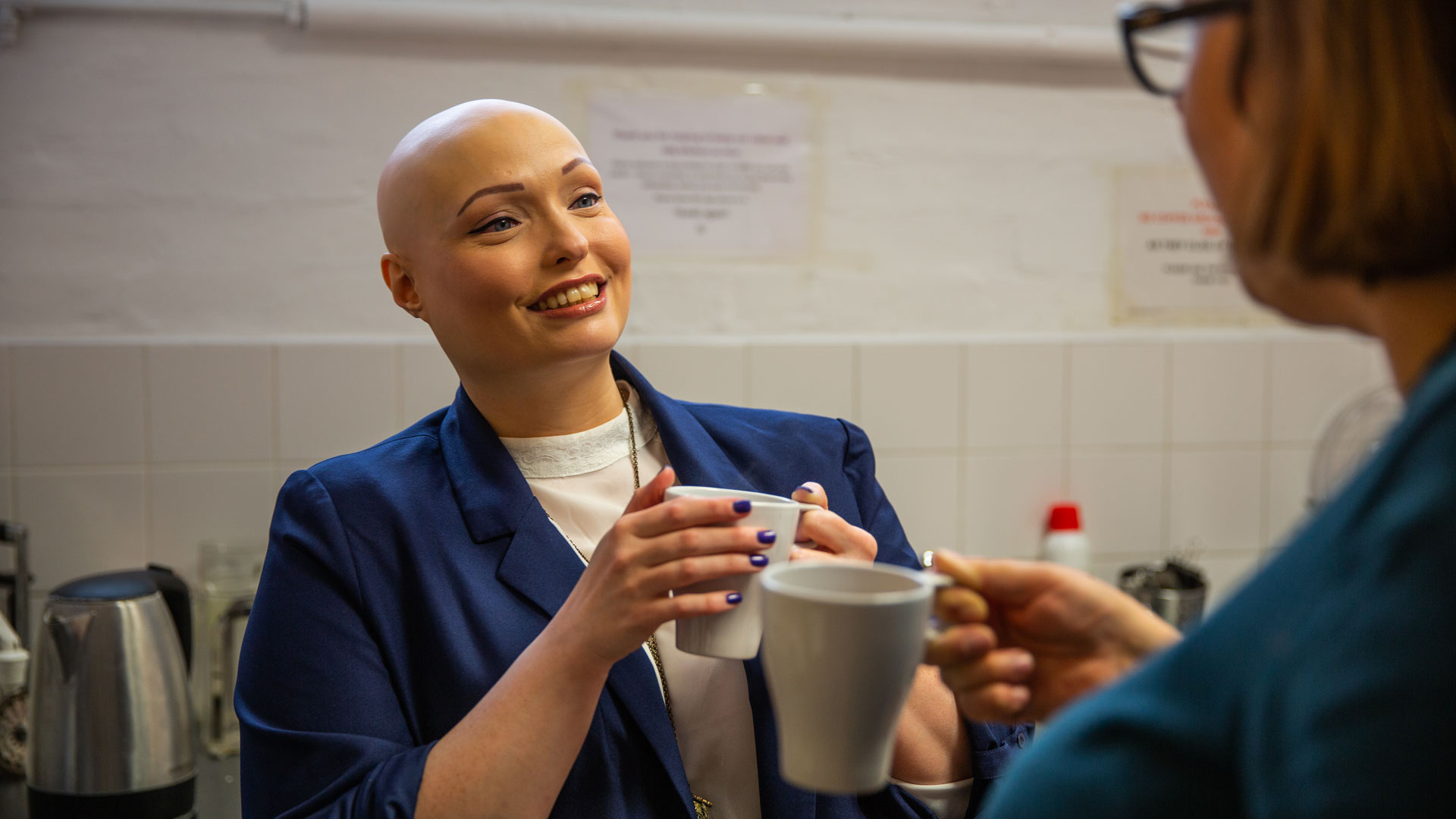The following story is by Lucy and shows the need for more research into Topical Steroid Withdrawal as different practitioners are providing varying advice. Currently, the National Eczema Association (NEA) 2023 recommends, ‘If you have been using higher strength TS for some weeks you should wean yourself off slowly and not stop suddenly’.
With this in mind, please allow the following personal experience to educate you but remember that everyone’s experiences can be different, and what works for one may not work for another.
CONTENT WARNING: this story includes what could be perceived as self-harm
My name is Lucy, and I’ve had eczema since I was a baby, but it wasn’t until 2020 that it played a significant role in my life.
During the pandemic, I developed very severe eczema on my hands. I experienced staring, unsolicited advice, and comments – mostly of concern – and particularly when I worked in a primary school. Children would stare and I’d softly explain about my condition. Some of them had eczema themselves and were excited to show me the cream they used for their own skin, but I also had one child who was terrified to hold my hand. That was a moment I had to deep-breathe through.
Fortunately, when I have flare ups, people only tend to notice when they’re close-up, so I’d either avoid socialising, or feel the need to explain myself before they’d form their own narratives about me.
In August 2022, I had been suffering for two years with the severe hand-eczema (since the hand-sanitising saga dried them out) as well as cycles of dry, seeping, red, itchy, swollen eczema around my lips, my neck, and my nipples. I’d had my breasts screened for breast cancer and I was just about done with trying to live with this skin condition after being told by my GP that there was no cure.
I had this habitual thinking that eczema was an enemy, something that invaded me and my body, violated me, took control of my life.
I thought I’d try a new approach, rather than accepting it, and seek help from a naturopath who told me to go cold turkey on the topical steroids I’d been using and change my creams and diet drastically overnight. I took it all on immediately and shortly after, all the eczema worsened. Within a few weeks, I had eczema all over my body, and was experiencing (what I believe was) topical steroid withdrawal on top of an allergic reaction to an essential oil I’d used to make my own “natural” moisturiser. Following this were four of the worst months of my life.
After weeks of vacuuming dry skin from bed sheets every morning; my partner helping me shower with bottled water because I believed London’s water to be partially responsible for the severity of the flare up; and feeling shame to be seen by strangers and even myself in the mirror; I thought I’d hit rock bottom. Going to work meant sitting anxiously, scratching my forearms till they bled through layers, and sleeping was punctuated with tormented scratching and itching. I ended up asking my partner to pin my hands down to stop me from harming myself further.

Lucy during a flare up
Red skinned, flaky, and shiny, I moved home to my parents in the countryside, hoping it would help calm me. I did Christmas and new year with no alcohol, caffeine, gluten, soya, or nightshade vegetables, after being led into believing all these things could be to blame for the condition and the flare up. Then, in the new year, the real rock bottom hit.
The eczema flare up was complicated by the herpes simplex virus (which I was unaware I had) and became eczema herpeticum: a condition where open sores spread rapidly over all eczema affected areas which, for me, meant everywhere. My armpits, face, hands, nipples, torso and arms were covered in open sores that can be contagious to vulnerable people. I felt panic, pain, humiliation, shame, torment, stress and sadness.
I was told by the emergency dermatologist to accept topical steroid treatment and a six-week regime to heal my skin barrier. I was so scared to go back to using topical steroids because of the fearmongering and misinformation I’d experienced. I felt totally defeated.
Somewhere along the way, I’d shared a little about my struggle on my social media and someone had recommended Changing Faces as a place to find support. I tried to override the thoughts of “you’re not deserving of support as much as other people” and in late January began wellbeing sessions with a very lovely and down to earth, Lisa. These provided a guilt-free space to talk about myself and my struggles, and a place to expand the possibility of my mindset around this skin condition: eczema.
I had this habitual thinking that eczema was an enemy, something that invaded me and my body, violated me, took control of my life. Any sign of a flare up would mean panic, feeling out of control, then feeling guilty for any food I may have eaten to cause it, or environment I’d been in, and immediately trying to change aspects of my life to not repeat another flare.
It’s been a long journey for me, and the space created in the wellbeing sessions from Changing Faces allowed me to transform how I relate to my visible difference.
I also had this thinking that steroids were the enemy and would cause attachment issues and long-term health problems in my body. The wellbeing sessions from Changing Faces allowed me to reflect on the narratives I had around the condition, and its various treatments, and adopt alternative narratives that meant, when a flare up occurred, I could breathe, accept it was happening, notice how it felt when calm, and choose the best way forward to cope.
Nowadays, I still live with eczema but it’s no longer the main antagonist. It is, for the most part, a non-speaking background character in the movie of my life. When she flares up, I notice her, sometimes her pink speckles are pretty, I notice how she feels in my skin, I wonder about what could have caused her to flare, and I accept that – most of the time – I cannot explain her presence.
I practice acceptance and I am able to weigh up with reason – not panic and despair – whether I’ll use topical steroids to suppress her, according to the advice I now accept from the eczema-specialist dermatologist. I’m also able to better manage possible comments and staring now, no longer minding about their judgements. This has helped to ease my anxiety in social situations, interrupting the itch-scratch cycle I often found myself in.
It’s been a long journey for me, and the space created in the wellbeing sessions from Changing Faces allowed me to transform how I relate to my visible difference. Sometimes, I even feel proud of the visible difference because it connects me to a community of other’s through @itchnbitch on social media.
When I see others with visible differences, I want to say, ‘Hey! Me too! I get it’. I think the journey I’ve been on with this skin condition makes me wiser, more grateful, funnier, and more empathetic.
As a singer-songwriter (@musicby_luce), I have a platform to tell stories of healing and recovery, and this is one of the stories I tell in my music. I advocate for sharing stories openly, honestly, and courageously because of the catharsis and connection it brings. I hope, in reading this story of mine, you’ve felt connected too.

